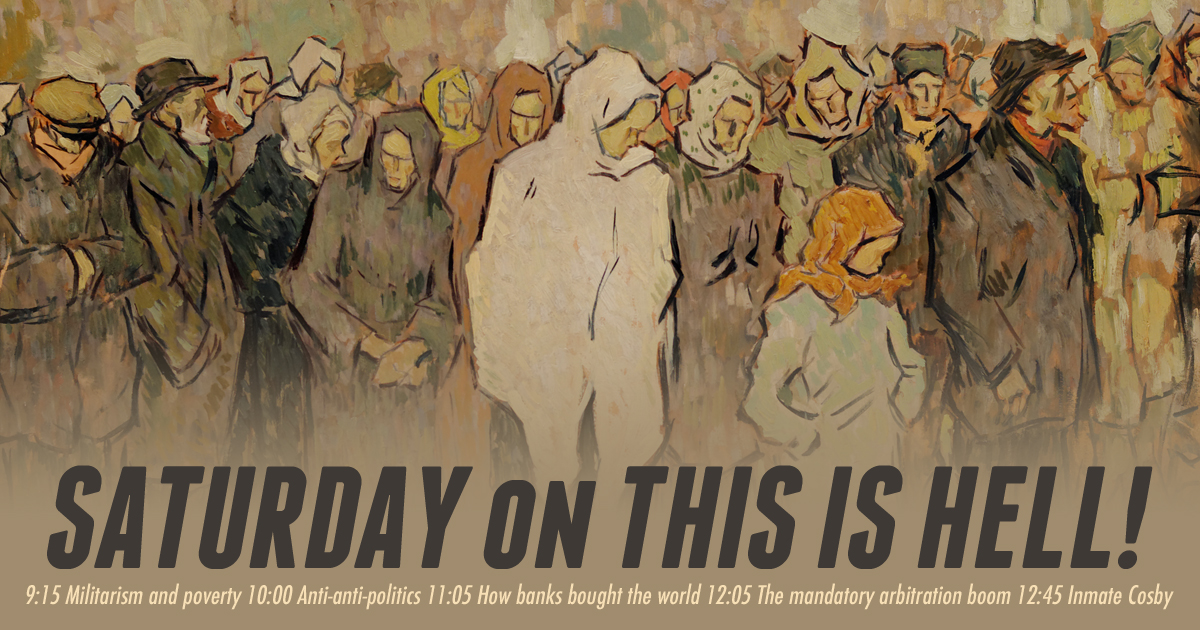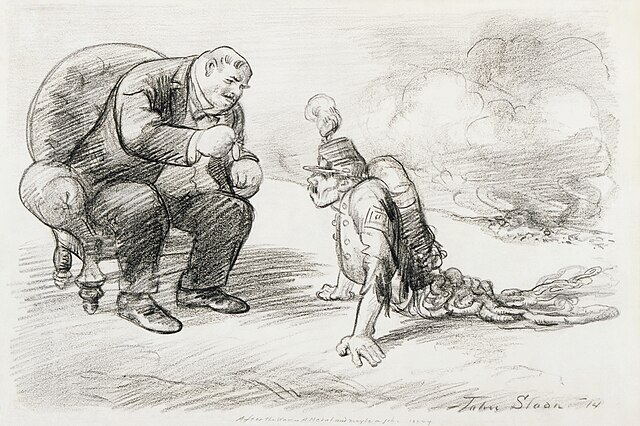Listen live from 9AM - 1:00PM Central on WNUR 89.3FM / stream at www.thisishell.com / subscribe to the podcast
9:15 - Policy analyst Phyllis Bennis connects American militarism abroad to deep poverty at home.
Phyllis is co-author of The Institute for Policy Studies report The Souls of Poor Folk.
10:00 - Writer Eliane Glaser calls for the left to reclaim the power of ideology, authority and the state.
Eliane is author of Anti-Politics: On the Demonization of Ideology, Authority and the State from Repeater Books.
11:05 - Journalist Nomi Prins explains how central banks bought world power in an age of global crisis.
Nomi is author of Collusion: How Central Bankers Rigged the World from Nation Books.
12:05 - Jacobin's Meagan Day explores the rigged, anti-worker system of mandatory arbitration.
Meagan wrote the articles The Conference Room Is Replacing the Courtroom and The Democrats and the Deficit Con for Jacobin.
12:45 - In a Moment of Truth, Jeff Dorchen visits Bill Cosby in prison.
Welcome to the Moment of Truth: the thirst that is the drink.
I was born into a bright, cold room. The color scheme was unappealing. I was anxious about the motives of the people there. Were they hostile to me? I felt they were. Though inscrutable behind their institutional green cloth masks, covering their mouths and noses, I was almost certain they didn't like me. Also, the floor looked slippery. Why the masks, gloves, and aprons? Did they think they were going to catch something from me? Why didn't someone put some nice mood music on? What's that screaming? Oh, it's me.
That pretty much set the tone for the rest of my life. I enter any room, and it's like someone clicked on the YouTube video of my birth, from my POV. Complete with worryingly possibly hostile hospital staff.
It's the same when I go outdoors. The long and the short of it is, I expect the worst. Pollution. Rude farmers. Volcanoes. Wilted spinach. And those are exactly the things that come my way. I look in the mirror and have body dysmorphia. It's worked so well, my body now actually does look like a pile of crap. And it works on the world, too. I have environmental dysmorphia. And I've been at it so long, the world is turning to crap. I have atmospheric dysmorphia as well as gestalt dysmorphia. And it's effective. I can turn anything into its worst possible self.
So y'all can blame me for the dying bees. When I was four years old, I remember, I was standing on the step to the side door of our little orange and black house in Oak Park, Michigan. I felt something buzzing around my head. I asked my father, who was probably, unbeknownst to me, slightly too far away to hear me, what was buzzing around my hair, a fly or a bee? He smiled at me. I said, "I guess it's a fly." Guess what I did? I bothered the bee, and paid the price. I screamed in agony for a good half hour while my father took me around to different neighbors to ask what to do about the pain of a bee sting. He even asked the workmen putting down concrete in front of our house. Everyone said the same thing: baking soda. We didn't have any. Anyway, what if we had? What then? Were we supposed to sprinkle it on the place where the bee had stung me? Make a poultice? Was I supposed to snort it?
When my dad asked the workmen, I noticed a thick aura of masculinity around them, in contrast to the emasculation of a young father dragging his shrieking little boy around helplessly. That was the... read more
Listen live from 9AM - 1:00PM Central on WNUR 89.3FM / stream at www.thisishell.com / subscribe to the podcast
9:20 - Live from Seoul, Marc Flury reports on the long, sudden end of the Korean War.
Marc will be reporting on yesterday's Inter-Korean Summit between Kim Jong-un and Moon Jae-in.
10:00 - Historian Samuel Moyn explains why human rights won't deliver social and economic justice.
Samuel is author of Not Enough: Human Rights in an Unequal World from Harvard University Press.
11:05 - The Oakland Institute's Anuradha Mittal calls for an end to the World Bank's ranking programs.
The Oakland Institute released the brief A Death Knell for the EBA? on their website.
11:35 - Journalist Julianne Tveten examines dissent's brand in a new age of commodified protest.
Julianne wrote the article Living in a Pepsi Ad World for The New Republic.
12:05 - Anthropologist Michaelanne Dye explores the IRL peer-to-peer network of Cuba's offline internet.
Michaelanne is co-author of the paper El Paquete Semanal: The Week's Internet in Havana, presented at the 2018 Conference on Human Factors in Computing Systems.
12:45 - In a Moment of Truth, Jeff Dorchen takes a trip down anxiety lane.
Something tells me Jeff knows the route pretty well.
Welcome to the Moment of Truth, the thirst that is the drink.
The title of this moment is The Eerie Canal. Unlike the Uncanny Valley, the Eerie Canal is all too embedded in actual human flesh. What's eerie about it? Let's catch a gondola and see.
A baby is about to emerge from within its mother, but before it commits to entering the world through a parting of what my friend Mike in high school called, disgustingly, but I can't get his phrase out of my head, so shame on me, "the roast beef curtain," it weighs its future possibilities. This baby is scheduled to momentarily make its grand entrance into what Shakespeare, who learned things before the advent of high school, called "this mortal coil." But the baby hesitates, because the curtain it is to enter from behind is also what liberal philosopher John Rawls, who had no friends in high school, or if he did, did not retain their sophomorically sexist if evocative nomenclature for aspects of the female anatomy, called "The Veil of Ignorance."
The Veil of Ignorance is a thought experiment: how would you design a society if it were possible that, once it was built, you might end up anywhere in it, in any social position, any geographic position, any economic position, any physical situation. You were ignorant of whether you would be rich or poor, strong or sickly, intelligent or mentally challenged, or somewhere in between. You just didn't know. Rawls didn't answer the question of what kind of society was to be designed. He posed it as an approach to thinking about justice and fairness and compassion, limits on power, and society's responsibility for the living conditions of the individuals it comprises.
This baby is as ignorant of its future status as any intentionally ignorant social thinker playing this theoretical game. It does know that it's human, but it doesn't know who its mother is. It doesn't even know its own sex, if you can believe it. Well, it's dark in there. Yes, it could feel around to find out, but to be honest, it would like to keep that information a surprise for itself.
So, this about-to-be-born baby has some things to work out. Unlike in Rawls' thought experiment, this baby knows what current societies are like. It's not that ignorant. It knows what Ugandan society is like, and it knows what Norwegian society is like. And it knows what conditions are like in various locations within those societies. It just doesn't know what kind of person it's... read more
Listen live from 9AM - 1:00PM Central on WNUR 89.3FM / stream at www.thisishell.com / subscribe to the podcast
9:15 - Writer Corey Pein explores the boring, brutal world of Silicon Valley tech culture.
Corey is author of Live Work Work Work Die: A Journey into the Savage Heart of Silicon Valley from Metropolitan Books.
10:00 - Historian Tithi Bhattacharya explains why women are leading strikes across America.
Tithi wrote the Guardian op-ed Women are leading the wave of strikes in America. Here's why.
10:35 - Journalist Jacob Hamburger examines the space between elites and democracy in France.
Jacob wrote the article Can There Be a Left Populism? for Jacobin, and his blog Tocqueville 21 posted the symposium Focus: Elites and Democracy in France.
11:05 - Geoff Mann and Joel Wainwright preview the new politics of a planet under rapid climate change.
Geoff and Joel are authors of the book Climate Leviathan: A Political Theory of Our Planetary Future from Verso.
12:05 - Journalist Kate Aronoff finds denialism built deep within market-based climate change solutions.
Kate wrote the article Denial By A Different Name: It’s Time to Admit That Half-Measures Can’t Stop Climate Change for The Intercept.
12:45 In a Moment of Truth, Jeff Dorchen explores the birth canal.
Figuratively. Maybe not. Dunno what Jeff's into these days.
Welcome to the moment of truth: the thirst that is the drink.
President Dump finally did it: he triggered the nuclear trade wars, a chain reaction of mutually prohibitive tariffs, a global web of protectionist punishments.
Now, no one can afford to live. I'm going to pretend this is not an exaggeration. Let's see how that goes.
No one can afford a place to live. Apartments and houses stand vacant because the rents and mortgages are too damn high. Landlords receive nothing for their properties, so they themselves must vacate their homes. What's propping up the price if not demand? Some artificial thing, a principle or an attitude no one understands. Even the banks receive no income from properties. The streets are lined with shanties made of reclaimed garbage.
No one can afford to buy food. Food rots in the supermarket because no one has the money to buy it. The cashiers and stock boys and baggers and managers haven’t worked in months, because the grocery stores aren't taking in any revenue.
The food gets thrown out, but some loyal employee takes it upon himself, without pay, to pour bleach all over it to make sure it can't be eaten by the scavenging homeless, which is all of us. That loyal employee is a jerk, but we understand his desire to please his now non-existent boss: he has Stock Boy Syndrome.
The farmers are out of business because no one can afford what they grow, and pretty soon the farmers themselves can't afford to grow it.
Artists are still making art, because artists are used to working for nothing. Teachers are teaching, because they're used to working without resources. They're teaching the homeless kids, which is all the kids. Firemen are still putting out fires with whatever tools they can get their hands on, out of a sense of duty, just to keep abandoned burning buildings from injuring anyone.
The prisoners are freed. The state can't afford to keep them in prison. The guards, even the crazy super-loyal ones, walk off the job, because everyone has something better to do, even if it's nothing. When the computers turn off the prison electricity, the generator power kicks in, and some kind or foolish soul opens everything before that auxiliary juice runs out.
Cops are preventing theft and committing it themselves, as usual. But nothing they steal is worth anything anymore. Gangs are protecting people for free. For loyalty. For whatever humans have that makes it worthwhile for a strong... read more
Listen live from 9AM - 1:00PM Central on WNUR 89.3FM / stream at www.thisishell.com / subscribe to the podcast
9:15 - Literary scholar Emily Apter surveys the allness and everywhereness of micropolitics.
Emily is author of Unexceptional Politics: On Obstruction, Impasse, and the Impolitic from Verso.
10:00 - Our Man in Budapest, Todd Williams reports on the non-surprise of last week's Hungarian elections.
The results are definitely not suprising to anyone who caught Todd's last report in 2017 on Orban's political dominance.
10:35 - Live from São Paulo, Brian Mier reports on Lula's imprisonment and left resistance across Brazil.
Brian co-wrote the article Lula's Arrest and the True State of the Brazilian Left for NACLA.
11:05 - Historian Gerald Horne explores colonialism's apocalyptic history of slavery and dispossession.
Gerald is author of The Apocalypse of Settler Colonialism: The Roots of Slavery, White Supremacy, and Capitalism in Seventeenth-Century North America and the Caribbean from Monthly Review Press.
12:00 - Writer Nick Murray examines the intersection of farming, corporate technology and country music.
Nick wrote the essay Agriculture Wars for Viewpoint Magazine.
12:35 - In a Moment of Truth, Jeff Dorchen figures out why no one can afford to live anymore.








